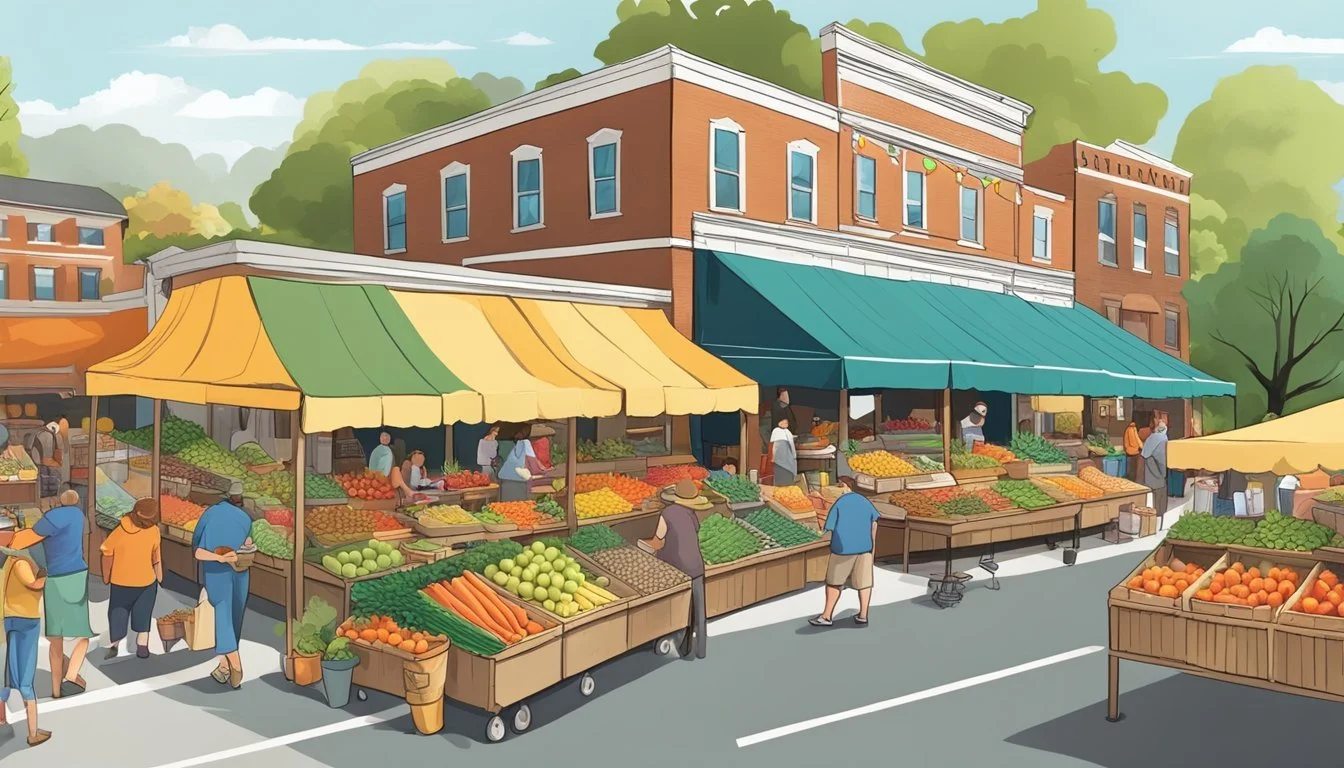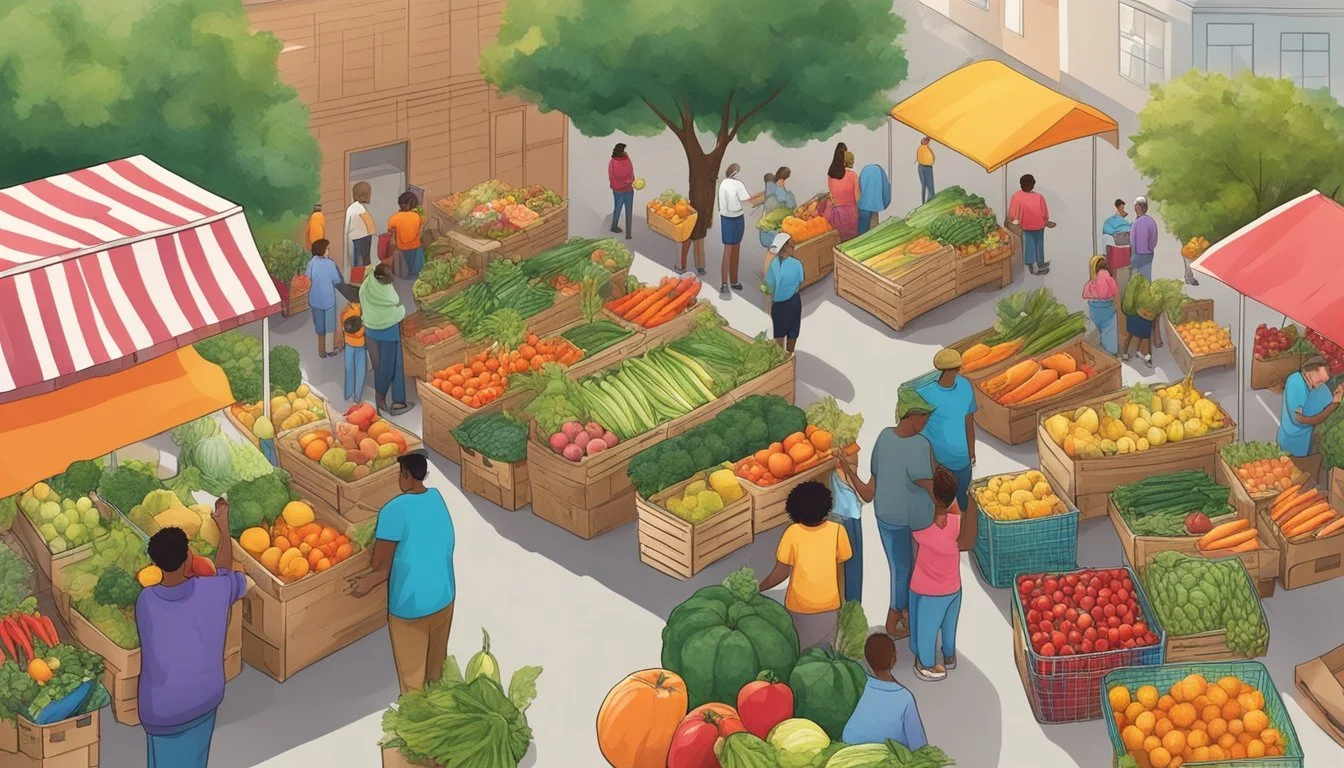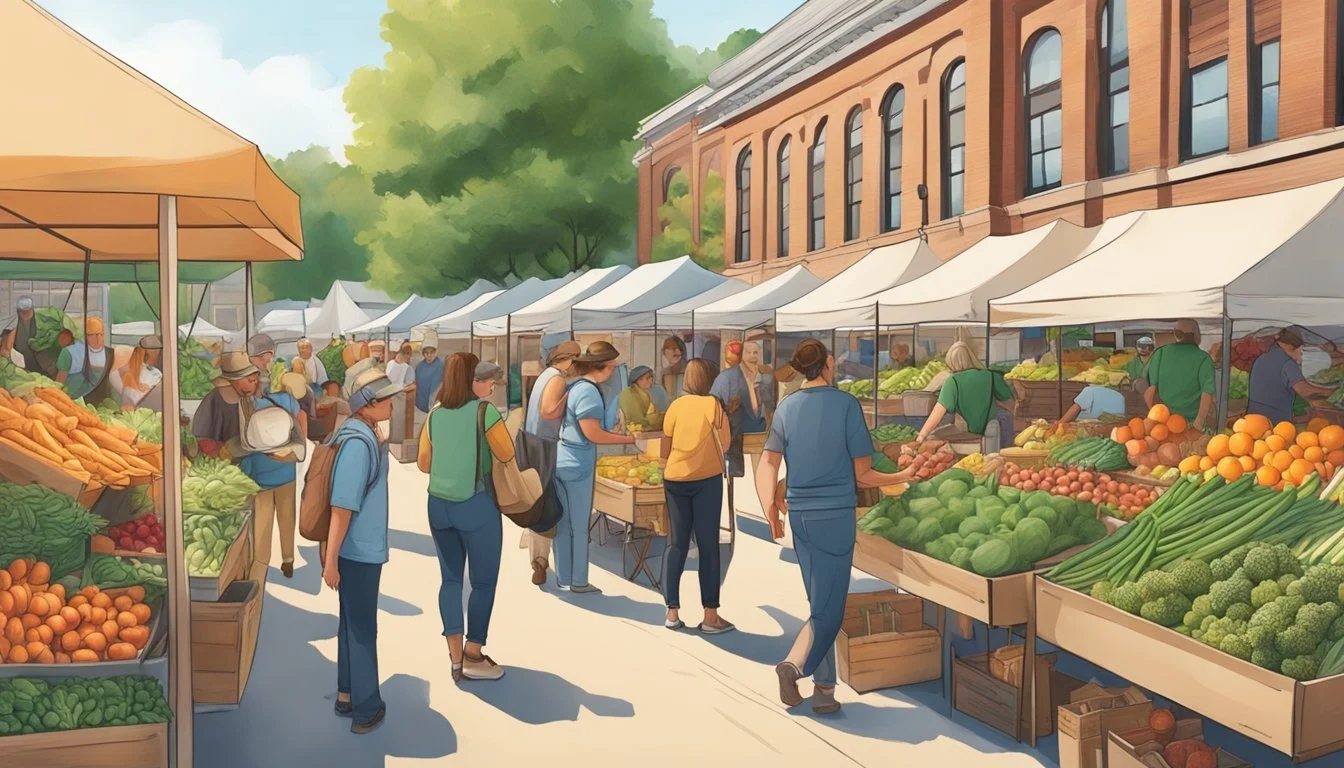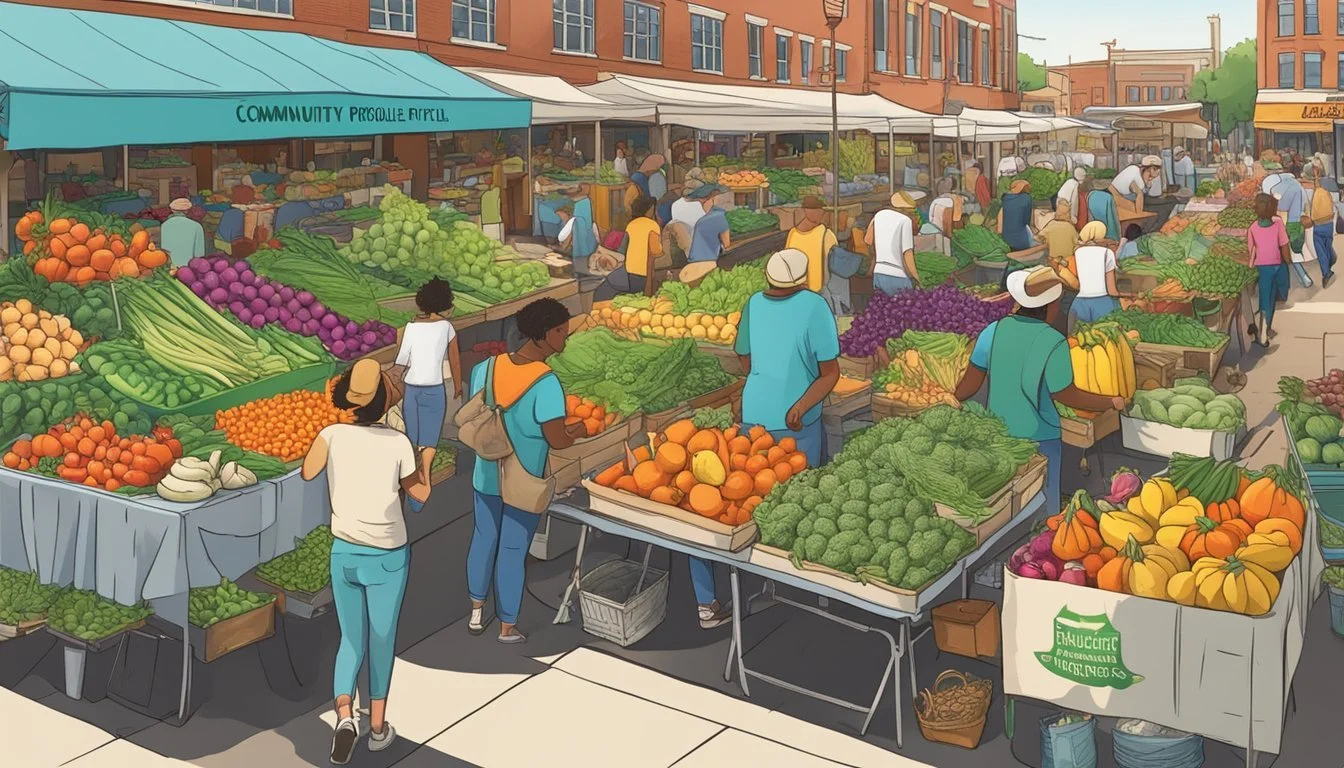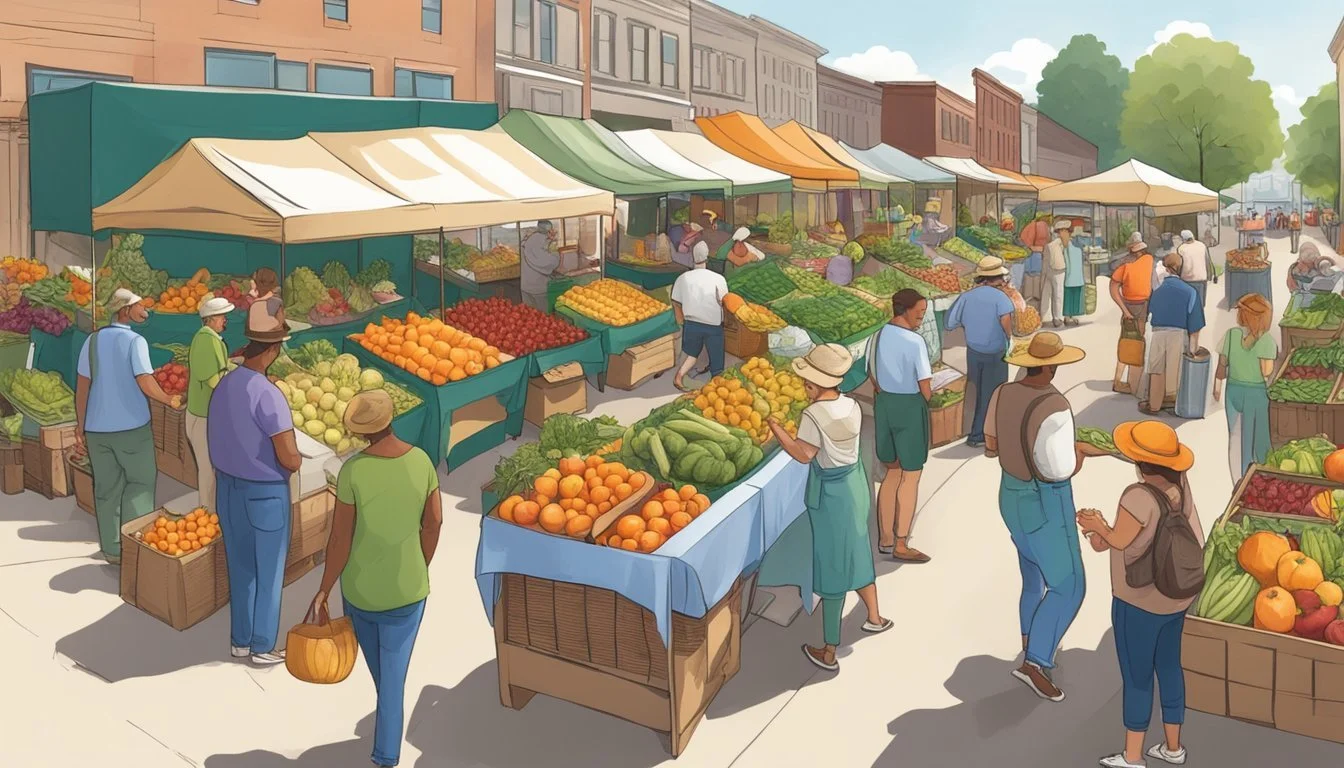Community Supported Agriculture (CSA) in Knoxville, TN
A Guide to Local Farm Shares
Community Supported Agriculture, commonly referred to as CSA, has taken root in Knoxville, TN, as a popular way for consumers to buy seasonal food directly from local farms. With a CSA, members purchase a share of the harvest in advance, supporting the farm's operation at the beginning of the growing season. In return, they receive regular distributions of fresh produce, often weekly, throughout the farming season. This model benefits both the farmers, who gain financial security from the upfront payments, and the consumers, who enjoy fresh, locally-grown produce.
The CSA model in Knoxville fosters a closer link between residents and the sources of their food. Participants are privy to the natural growing cycles of the region and develop a greater appreciation for sustainable agricultural practices. Many Knoxville-based CSAs also offer more than just produce; they include a variety of other farm products such as herbs, edible flowers, and sometimes even eggs or dairy.
Knoxville's CSA scene is diverse, with options ranging from urban farms to student-operated initiatives. Farms like Under Foot Farm embrace ecological methods, forgoing synthetic pesticides and fertilizers to ensure the health of their soil and crops. Programs like those run by the University of Tennessee provide educational opportunities while supplying community members with fresh, organic produce. Through these varied CSA programs, Knoxville residents are able to access high-quality food, support local agriculture, and contribute to a more sustainable food system.
The Basics of CSA
Community Supported Agriculture in Knoxville, TN, fosters a direct link between local consumers and farmers, where community members receive fresh, seasonal produce throughout various times of the year, based on the harvest.
Defining CSA
Community Supported Agriculture, or CSA, represents a model in which consumers buy shares of a farm's harvest in advance. By committing funds early, consumers become stakeholders in the farm's seasonal production and in turn receive a portion of the crops as they are harvested.
History and Development of CSA in Knoxville
Knoxville's CSA history has seen a growth in farms offering shares to the public, embracing sustainable and ecological farming practices. As part of the local food movement, farms such as Under Foot Farm in South Knoxville have been utilising ecological methods to bolster healthy soil and crops, ensuring that the CSA shares consist of a variety of fresh and local produce.
Benefits of Joining a CSA
By joining a CSA, consumers in Knoxville support local agriculture and receive numerous benefits:
Freshness: Access to produce that is often picked within 24 hours of distribution.
Variety: A diverse range of local, seasonal produce.
Community: Strengthened connection with local farmers and the community.
How CSA Works
In Knoxville, TN, a CSA operates on a subscription-like basis where the consumer pays an upfront fee to the farmer. This financial support helps cover the initial annual costs of the farm. In return, throughout the growing season, consumers receive a weekly or bi-weekly share of farm produce, which may include vegetables, fruits, herbs, and sometimes additional farm products like eggs or dairy.
CSA Seasonal Timeline
The CSA timeline in Knoxville usually aligns with the natural growing seasons:
Spring: The start of the CSA and can include leafy greens, herbs, and spring vegetables.
Summer: A variety of fruits and vegetables including tomatoes, peppers, and berries.
Fall: Root vegetables and autumn harvest items such as pumpkins.
Winter: Some CSAs offer winter shares with storage crops and greenhouse-grown produce.
Through each season, CSA members experience the natural ebb and flow of farm production and become intricately linked to their local food system.
Local CSA Farms
Knoxville, Tennessee, offers a diverse range of CSA farms, each providing fresh, locally-sourced produce and meats through community-supported partnerships between farmers and consumers.
Profiles of Knoxville's CSA Farms
Knoxville's CSA landscape features farms such as Kimberlin Creek Quail (What wine goes well with quail?), known for its quail offerings, and Clear Springs Farm in Corryton, with its Certified Naturally Grown fruits and herbs. These farms epitomize the strong connection between consumers and local farms, offering a share of their bountiful harvests through CSA memberships.
Sustainable Practices in Knoxville CSA
Local Knoxville CSA farms are committed to sustainable agriculture. They employ practices that ensure the health of the land and the quality of the produce. Examples include the application of organic farming methods, the use of free-range principles for livestock, and a dedication to preserving ecological balance.
Choosing the Right CSA for You
When selecting a CSA in Knoxville, consumers should consider factors such as location, the variety of vegetables and meats offered, and the farming practices used. Membership terms, pick-up options, and the type of shares available—whether mixed produce, all-vegetable, or meat-oriented—are also important considerations.
Navigate CSA Registration
To become a CSA member, individuals typically register with a local Knoxville farm of choice, agreeing to a seasonal or annual membership. Registration info can be found directly on the farms' websites, with some offering online sign-ups or requiring a visit to the farm or a local farmers market.
Knox County CSA Locations
The county's CSA locations are dispersed throughout the area, including urban options like Beardsley Community Farm in Knoxville and more rural options closer to surrounding areas such as Maryville and Cedar Bluff. LocalHarvest and the Knox County CSA Guide are valuable resources for locating these farms and understanding the specifics of their offerings.
Agricultural Practices
In Knoxville, Tennessee, the commitment to sustainable and organic farming methods reflects in the agricultural practices of local Community Supported Agriculture (CSA) programs. Farmers prioritize environmentally friendly techniques and animal welfare in their pursuit to provide fresh, local produce and animal products to the community.
Organic and Sustainable Farming
Organic farming plays a significant role in Knoxville's CSAs, with many adhering to practices that are certified organic. These farms:
Avoid synthetic pesticides and fertilizers.
Utilize crop rotation and green manure for soil health.
Emphasize the growth of a diverse range of seasonal vegetables.
Sustainable agriculture also encompasses the responsible use of water and the promotion of biodiversity. These practices ensure that the production of vegetables and other produce like corn and soy is in harmony with nature.
Animal Husbandry in CSAs
Animal husbandry within these CSAs often focuses on ethical and humane treatment. Livestock such as chickens and lambs are typically:
Grass-fed and given ample pasture to roam (free-range).
Raised without the use of hormones or unnecessary antibiotics.
This level of care for animal welfare not only reflects the values of Knoxville's farming community but also contributes to the quality of the meat and eggs provided through CSA subscriptions.
Crop Production and Harvesting
The sustainable production of crops is central to CSAs in Knoxville, characterized by careful planning and execution of harvesting techniques. Farmers concentrate on:
Seasonal planting to provide a variety of fruits and vegetables year-round.
Crop diversity to reduce pests and improve soil quality.
Harvesting methods that minimize waste and maintain the quality of the produce.
This ensures that subscribers receive fresh, high-quality vegetables and other crops at the peak of their flavor and nutritional value.
Economic and Social Impact
Community Supported Agriculture (CSA) has become a pivotal element in reinforcing Knoxville's local economy while simultaneously advancing communal education and cohesion.
CSA's Role in Local Economy
CSA programs in Knoxville, like the one offered by Under Foot Farm, directly stimulate the local economy by providing avenues for consumers to invest in regional agricultural businesses. Consumers participate in direct marketing by paying for seasonal produce in advance, which injects early season capital into these farms. This model not only benefits local businesses but also reduces the carbon footprint tied to long-distance transportation of food products, reinforcing the economic principle of keeping money circulating within the community.
CSA and Food Education
Educational components are often interwoven into CSA projects, with entities like Nourish Knoxville fostering a deeper understanding of sustainable agriculture through inclusive community projects. These programs serve as hands-on opportunities for individuals to learn about food production and ecological stewardship. Education extends into the realm of research, as with the VOLunteer Supported Agriculture (VSA) program designed to teach University of Tennessee Knoxville students about organic farming, contributing to a knowledgeable generation of future farmers and consumers.
Community Building and CSA
CSAs thrive on the principle of building community. Knoxville's CSA initiatives often incorporate volunteer opportunities, as seen with Nourish Knoxville’s workshare CSA, where local, low-income individuals can contribute labor in exchange for fresh produce. Such engagements foster a sense of ownership and pride among community members, strengthen social ties, and ensure that all individuals, regardless of economic status, have access to healthy, local food. This synergy enhances the social fabric of the community and demonstrates the broader societal gains attributable to community supported agriculture.
Engagement and Opportunities
Community Supported Agriculture (CSA) in Knoxville, TN, offers diverse engagement avenues and opportunities for community members to connect with local food systems. These programs contribute to a more sustainable food network and educational enrichment for volunteers and participants.
Volunteering and Internships
Nourish Knoxville facilitates a variety of opportunities where individuals can volunteer or apply for internships, embracing an active role in local CSAs. For instance, Urban farms in South Knoxville encourage community members to assist with daily farm tasks, with volunteer hours typically set and communicated by the farms. Students seeking practical experience can benefit from student internships offered by CSA initiatives in the region, like at the University of Tennessee Knoxville, which runs a student-operated CSA.
Beardsley Community Farm:
Volunteer Hours: Season-dependent, check for updates
Internships: Offers WorkShare CSAs for experience
Educational Programs Related to CSA
CSAs in Knoxville are committed to education alongside production, offering programs that teach about sustainable food systems and gardening. Participants can learn ecological methods of producing vegetables and managing soil health. Nourish Knoxville and local CSA farms often collaborate on these educational projects, aiming to enhance community knowledge and involvement in sustainable urban agriculture.
Educational Offerings:
Workshops on ecological farming methods
Projects promoting food security
Events and Seasonal Activities
Seasonal events are a staple of the CSA experience in Knoxville, allowing the community to engage in special projects and celebrate harvests together. These events provide insight into the seasonal rhythms of farming and offer chances to enjoy fresh produce. Farms may schedule seasonal activities, such as spring/summer CSA offerings and harvest festivals, that are open to the public, facilitating a deeper connection between consumers and their local food producers.
Seasonal Highlights:
Spring/Summer CSA Sign-ups
Harvest Festivals and Community Gatherings
Navigating CSA Regulations
Community Supported Agriculture (CSA) in Knoxville, TN, operates under a framework of USDA standards and local permits and guidelines. It is essential for producers and consumers to understand these regulations to ensure compliance and the success of CSAs.
Understanding USDA Standards
The United States Department of Agriculture (USDA) provides regulations that are key to maintaining the integrity of CSA operations. For instance, Knox County CSA producers claiming to offer certified organic produce must adhere to USDA organic standards. This requires detailed record-keeping, the use of approved methods and substances, and undergoing annual inspections. CSA farmers must ensure their practices align with the following standards:
Production Standards: Implementation of organic practices that promote ecological balance, conserve biodiversity, and avoid the use of synthetic fertilizers and pesticides.
Handling Standards: Careful oversight of the storage, processing, and shipping of organic products to prevent commingling with non-organic items.
Labeling Standards: Correct usage of the USDA organic seal and accurate product descriptions on marketing materials and packaging.
USDA certifications are crucial for transparency and trust within the CSA model, providing peace of mind for consumers investing in local, sustainable agriculture.
Local Permits and Guidelines
Participation in Knoxville's CSA scene also demands an understanding of local ordinances. Farmers must obtain the necessary permits and follow local guidelines to operate legally. Knox County health department and agricultural extensions outline specific regulations for the sale of farm produce. Local rules to be aware of include:
Markets and Sales: Regulations around where and how CSA shares can be distributed, including farmers' markets, roadside stands, and direct-to-consumer deliveries.
Zoning Laws: Ensuring that agricultural activities are within the designated zones and conforming to local land use policies.
Business Licensing: CSA operators in Knoxville may be required to hold a valid business license to sell produce.
Farmers should contact local authorities to obtain a complete set of requirements and confirm their responsibilities. Compliance with local permits and USDA standards ensures the vitality and sustainability of Community Supported Agriculture in the Knoxville region.
Marketing and Outreach
The marketing and outreach strategies for Community Supported Agriculture (CSA) in Knoxville, TN, are essential for sustaining direct relationships between farmers and the community while ensuring a steady market for fresh, local produce.
Direct Marketing Strategies for CSAs
CSAs in Knoxville adopt direct marketing strategies to connect with members of the local community. Under Foot Farm, for instance, uses ecological methods to grow their products, which they market directly to consumers without relying on synthetic pesticides or fertilizers. This approach solidifies their commitment to healthy soil and crops, creating a compelling narrative for potential CSA members who value sustainability. Additionally, farmers’ markets, such as Three Rivers Market, serve as a vital touchpoint for CSA farms to engage with consumers face-to-face, offering opportunities for on-the-spot sign-ups and direct sales of produce.
Engaging the Younger Community
CSA programs actively work to engage younger demographics, such as college students and young adults. The University of Tennessee Knoxville operates its own student-led CSA, where subscribers receive a weekly box of organic produce and flowers grown on campus. This engagement not only fosters agricultural interest among the youth but also secures a future customer base. Furthermore, initiatives like Beardsley Farm's workshare CSA encourage youth participation through a system where volunteering time on the farm earns participants baskets of fresh produce.
Digital Presence and Social Media
A robust digital presence complements traditional CSA marketing methods. Knoxville CSAs maintain informative websites and employ social media platforms to reach a broader audience. Regular posts about available CSA shares, highlights of seasonal produce, and behind-the-scenes glimpses of farm life engage existing and prospective CSA members. Social media platforms, especially when used to announce CSA sign-ups and farmers market appearances, are powerful tools for building an online community supportive of local and sustainable agriculture.
Using these strategies, Knoxville's CSAs succeed in directly marketing their produce to the community, fostering the next generation of eco-conscious consumers, and leveraging digital tools to amplify their reach.
Conclusion
Community Supported Agriculture (CSA) represents a valuable model for fostering strong relationships between local consumers and farmers in Knoxville, TN. Knoxville's community has recognized the mutual benefits of CSA programs, as evidenced by various initiatives and a growing popularity among residents.
Participants in CSA programs benefit from a stable source of fresh, seasonal produce while enabling farmers to secure a reliable income stream. It's an investment in sustained agriculture and an economically wise choice for both parties involved.
Local farms play a pivotal role by providing Knoxville with diverse agricultural products. They uphold eco-friendly practices, which are integral to maintaining soil health and biodiversity. By avoiding synthetic pesticides and fertilizers, these farms contribute to a safer local food system.
The array of CSA options available in Knoxville, including work-share arrangements and student-operated farms, highlights the inclusive nature of these programs. They provide opportunities for community engagement and education on sustainable practices.
Knoxville CSA Highlights - Emphasis on ecological farming - Support for local economy - Variety of produce available - Options for low-income individuals - Educational opportunities
In conclusion, CSA in Knoxville embodies a committed partnership between growers and the public. This collaboration ensures a future that values health, sustainability, and community stewardship.

